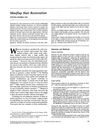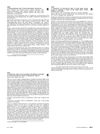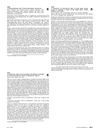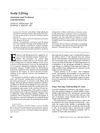Search
for
Sort by
Research
480-510 / 1000+ results
research An Overview of Female Pattern Hair Loss
Female pattern hair loss involves thinning hair on crown and frontal scalp, diagnosed by hair ratio, and treated with minoxidil, antiandrogens, or hair transplantation.
research Correction to: The Effects of Lower vs Higher Cell Number of Platelet-Rich Plasma on Hair Density and Diameter in Androgenetic Alopecia: A Randomized, Double-Blinded, Placebo, Parallel-Group Half-Scalp IRB-Approved Study
research A Study of the Geheimratsacken Angle as Predictor for Early Diagnosis of Androgenetic Alopecia in Adolescent Population

research Efficacy of Dr. SKS Hair Booster Serum in the Treatment of Female Pattern Alopecia in Patients With PCOS: An Open-Label, Non-Randomized, Prospective Study
Dr. SKS Hair Booster Serum effectively treats hair loss in women with PCOS.

research Miniflap Hair Restoration
The Miniflap Hair Restoration method effectively restores hair and reduces baldness, but may cause some hair loss and increased baldness in the crown, with the Juri flap method suggested as a quicker, less risky alternative.

research Female Pattern Hair Loss: An Overview
Female pattern hair loss treatments vary in effectiveness and may have side effects.

research Aromatase Inhibitors Induce Male Pattern Hair Loss in Women
Aromatase inhibitors cause male pattern hair loss in women.

research A Comparison of Self-Reported Signs of Facial Aging Among Women in Australia vs. Those in the United States, United Kingdom, and Canada
Women in Australia report different signs of facial aging compared to women in the US, UK, and Canada; men with Lichen planopilaris often have hormonal abnormalities and thyroid disease.

research A Clinicopathologic Study of Lichen Planopilaris Among Men
Most men with lichen planopilaris had it confirmed by biopsy and often had thyroid issues, sexual dysfunction, or prostate cancer, hinting at a link with hormonal problems.

research How Do You Treat Premature Hair Loss in Women in Your Practice
The document concludes that hair loss in women is treated with medications, therapies, and surgery in Western medicine, and with acupuncture and herbs in Chinese medicine, but hereditary hair loss is hard to reverse.

research Vascular Targeting for Botulinum Toxin Pain Injections
Botulinum toxin-A may increase hair growth and reduce hair loss in men with baldness, and injecting near blood vessels can improve pain relief and last longer.

research Botulinum Toxin A in the Treatment of Facial Reflex Sympathetic Dystrophy: A Case Report
Botulinum toxin-A injections in the scalp can reduce hair loss and promote new hair growth in men with certain types of baldness.

research The Use of Botulinum Toxin in the Treatment of Male Pattern Baldness
Botulinum toxin injections can reduce hair loss and stimulate new hair growth in some men with male pattern baldness.

research Balding Hair Follicle Dermal Papilla Cells Contain Higher Levels of Androgen Receptors Than Those From Non-Balding Scalp
Cells from balding scalps have more androgen receptors than cells from non-balding scalps.

research Finasteride 5 mg/Day Treatment of Patterned Hair Loss in Normo-Androgenetic Postmenopausal Women
Finasteride 5 mg/day effectively treats hair loss in postmenopausal women without hyper-androgenism.

research Hair Loss and Herbs for Treatment
Herbs can potentially treat hair loss by inhibiting a key enzyme and promoting hair growth, and deficiencies in zinc, biotin, and iron are linked to hair loss.

research Hair Loss in Women: A Study at Sheffield Royal Infirmary (1959-1966)
Hair loss in women often doesn't follow a pattern, isn't linked to age, may be genetic, and can be related to thyroid issues or other health factors.

research Women Who Present With Female Pattern Hair Loss Tend To Underestimate The Severity Of Their Hair Loss
Women with female pattern hair loss often underestimate how severe it is.

research Scalp Hair Regrowth in Hormone-Treated Transgender Woman
Hormone therapy with estradiol and spironolactone can regrow scalp hair in transgender women by lowering testosterone to female levels.

research Telogen Effluvium: Is There a Need for a New Classification
The paper suggests improving diagnosis and treatment of telogen effluvium but does not recommend a new classification system.

research Use of Vitamins and Minerals in the Treatment of Hair Loss: A Cross-Sectional Survey Among Dermatologists in Saudi Arabia
Many dermatologists in Saudi Arabia recommend vitamins and minerals for hair loss, often based on personal experience rather than strong evidence.

research Types and Treatment of Hair Loss in Men and Women
The article concludes that different types of hair loss require specific treatments and psychological support is important.

research Self-Assembled Chitosan Nanoparticles for Percutaneous Delivery of Caffeine: Preparation, Characterization, and In Vitro Release Studies
Chitosan nanoparticles are promising for sustained caffeine delivery through the skin.

research Acquired Uncombable Hair Syndrome in a 39-Year-Old Woman
A woman's hair changed to a dry, tangled texture that's hard to comb after treatment with spironolactone, suggesting the medication might cause such hair changes.

research Hair Restoration Surgery: Hair Transplantation and Micrografting
Hair transplantation and micrografting, used for baldness, involve moving hair follicles from hair-rich to bald areas, requiring careful procedure and post-care for success.

research Scalp Lifting
Scalp lifting surgery can safely and effectively reduce baldness if done with careful planning and proper technique.

research Successful Management of Folliculitis Decalvans
Folliculitis decalvans was successfully treated with doxycycline and ozenoxacin.

research Blockade of Androgen Markers Using a Novel Betasitosterol, Thioctic Acid, and Carnitine-Containing Compound in Prostate and Hair Follicle Cell-Based Assays
The new compound was more effective than finasteride in reducing markers of hair loss and prostate issues in cell tests.

research Selected Topics in Pediatric Hair Loss
The document concludes that early diagnosis and treatment are key for pediatric hair loss disorders, and addressing the emotional effects on children is important.